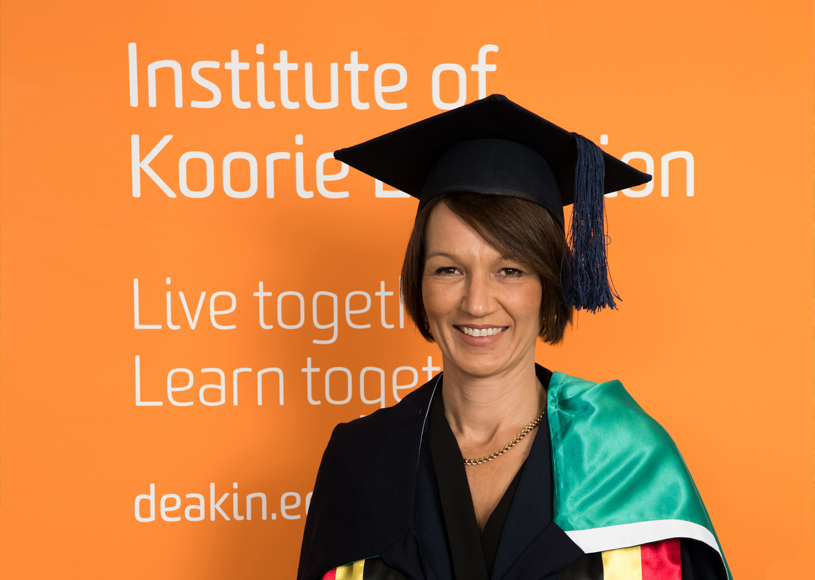Deakin Indigenous graduate, Alexis Spencer, is aiming to support Indigenous people to have meaningful careers in early childhood teaching – and benefit children in remote communities.
Alexis Spencer, a Deakin Indigenous graduate, has worked in the field of early childhood education for over 20 years across remote Australian communities. Her research suggests more support is needed for Aboriginal and Torres Strait Islander people to become early childhood teachers.
“We need to have Aboriginal and Torres Strait Islander people from their own communities teaching their own children,” she said.
“Presently, non-Indigenous teachers from the city are often going to the communities and teaching kindergarten-aged children for less than a year. I work with one school at the moment and the kindergarten class is up to its fifth non-Indigenous teacher this year.”
“It might be a different outcome if they have someone from their own community who is empowered to be that teacher, who knows the community and their people.”
According to the Australian Government’s “Closing the Gap” report, quality early childhood education is particularly important for Indigenous children and can have a positive impact on school attendance and academic success.
“If you get the children to love to learn early on, then they will hopefully be inspired to continue to love to come to school and be educated,” Ms Spencer said.
[testimonial_text]Early childhood education in Aboriginal and Torres Strait Islander communities is special and unique, but it needs more support. More work has to be done to enable and empower Aboriginal and Torres Strait Islander people to become confident teachers in a system that does not privilege their knowledge or pedagogy.[/testimonial_text]
[testimonial_picture name=”Alexis Spencer” details=”Deakin Indigenous graduate”]
 [/testimonial_picture]
[/testimonial_picture]“We need to think outside the square – there has to be a circular, relational and non-linear approach to how we go about achieving success. Our approach doesn’t fit into the mainstream way of looking at things, and it’s very valuable cultural learning.”
Ms Spencer is part of the first group of three recent graduates from a new post-graduate course in Indigenous Research at Deakin’s Institute of Koorie Education (IKE). The Graduate Diploma provided the opportunity for her to research Aboriginal perspectives of early childhood education and pedagogy.
“After completing my Bachelor degree in Early Childhood Teaching, I always wanted to go back to university, but I didn’t know what I wanted to do. Then I was told about the course by Naomi David, a lecturer at Deakin, and saw this Graduate Diploma as a good pathway to take before I embark on a PhD,” she said.
“I enjoyed learning about the research process and writing academically. The course gave me a lot of autonomy and agency to explore what I wanted to research and how I was going to go about it.”
The Graduate Diploma is delivered mostly by Indigenous academic staff with interdisciplinary skills across diverse areas and is only open to Aboriginal and Torres Strait Islander students.
The IKE’s Professor Tarquam McKenna said the course is premised on Indigenous leadership and honouring of Indigenous ways of knowing.
“This course is an innovation in that it addresses the realms of ‘white’ research paradigms alongside Indigenous Knowledge systems,” he said.
“The three graduates all addressed deeply significant world views that remain unique to them and their communities.”
Ms Spencer said her experiences within IKE during her Graduate Diploma have been positive.
“It has given me a breadth of professional networks and opened my eyes to many other possibilities and opportunities,” she said.
“Personally, it has also been really good, as learning about my Aboriginality is a growing journey. It’s been valuable to learn about culture through meeting other Aboriginal and Torres Strait Islander people.”
She is passionate about supporting Aboriginal and Torres Strait Islander people to enrol in early childhood teaching degrees and navigating pathways to overcome barriers to entry into teaching degrees.
“There are so many prerequisites that make it very difficult to be accepted to enrol, especially if you are a mature-aged Aboriginal or Torres Strait Islander student,” she said.
Ms Spencer currently works in Indigenous Education with the Education Department in Queensland and hopes to continue supporting Aboriginal and Torres Strait Islander teaching in various ways.
“I love going to remote communities and supporting and encouraging Aboriginal and Torres Strait Islander teachers and teachers’ aides to get their qualifications, while implementing early childhood programs in a culturally-appropriate way,” she said.
“I’d like to continue working with communities, rather than just being in an office, but I’d like to be in academia as well, where I can teach Aboriginal and Torres Strait Islander students how to be early childhood teachers.”
She is now preparing for her PhD next year, to continue her research into Aboriginal and Torres Strait Islander perspectives of pedagogy in early childhood education.
Published by Deakin Research on 20 November 2018



